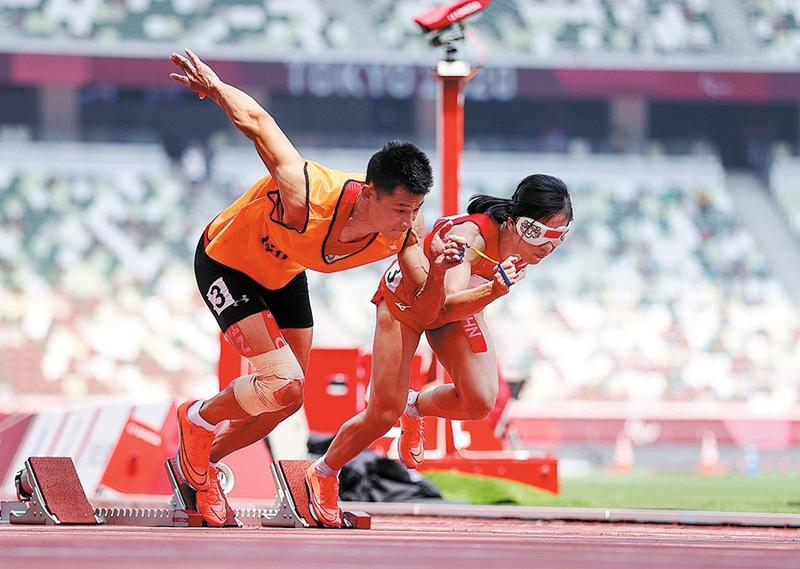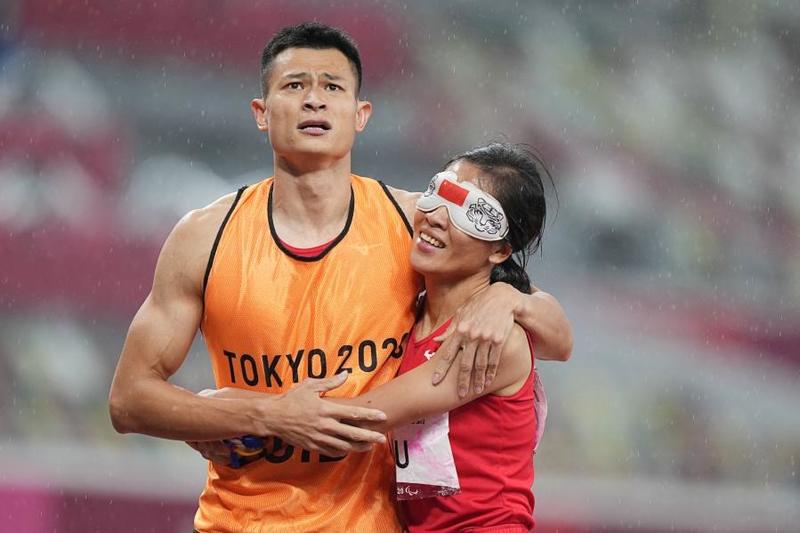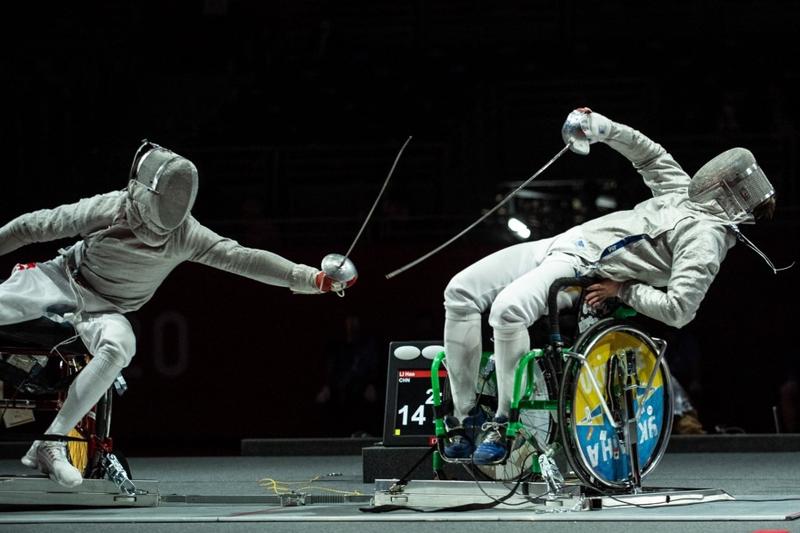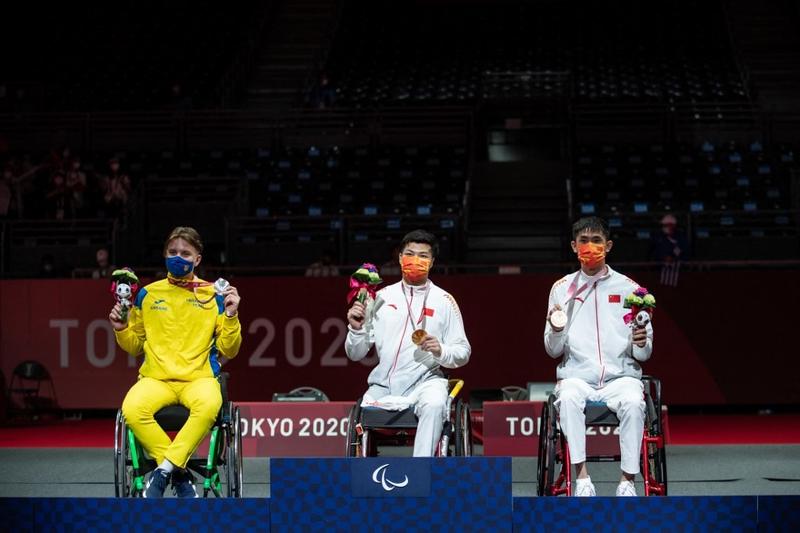 Liu Cuiqing and her guide, Xu Donglin, accelerate out of the blocks on their way to gold at the Tokyo Paralympics this summer. ( PHOTO /XINHUA)
Liu Cuiqing and her guide, Xu Donglin, accelerate out of the blocks on their way to gold at the Tokyo Paralympics this summer. ( PHOTO /XINHUA)
Were it not for sports, visually impaired sprinting champion Liu Cuiqing said she would probably be making a living as a masseur; Li Hao reckons the alternative to his wheelchair fencing career was likely a life of limited opportunities in his hometown.
Both cases illustrate the transformative power of the Paralympics, and now China's Tokyo 2020 heroes are encouraging others to follow their lead.
Liu Cuiqing sped to gold in the women's 200m T11 and 400m T11 finals with her trusty guide, Xu Donglin, by her side
"Due to the pandemic, the Tokyo Paralympics was postponed for a year, which meant an extra year of hard training. I'm 30 years old, so that was truly a challenge for a veteran like me," Liu told a media conference on Friday in Beijing, where China's top para-athletes from the Tokyo Games shared their inspirational stories.
"I picked up an injury in May, which was really close to the Games, so I didn't get sufficient time to rest and my fitness dropped very quick. All I could do was keep fighting to the end. My coach and my guide encouraged me, and I was well aware that pure persistence was my only hope."
Liu sped to gold in the women's 200m T11 and 400m T11 finals with her trusty guide, Xu Donglin, by her side. As a former sprinter at provincial level, Xu teamed up with Liu in 2013, and the two have worked closely together ever since to stride into the history books.
"We have the same dream, and we fought every day to achieve that dream. Over the last eight years, we have won 57 medals, including 45 golds, at all levels. A tether connects us, and through it we can feel each other's pace," said Xu.
ALSO READ: Chinese Paralympic team keeps top position in gold tally
 China's Liu Cuiqing (right) and her guide Xu Donglin celebrate after the women's T11 class 200m final of athletics event at the Tokyo 2020 Paralympic Games in Tokyo, Japan, Sept 4, 2021. (XIONG QI / XINHUA)
China's Liu Cuiqing (right) and her guide Xu Donglin celebrate after the women's T11 class 200m final of athletics event at the Tokyo 2020 Paralympic Games in Tokyo, Japan, Sept 4, 2021. (XIONG QI / XINHUA)
"Not all people who try hard can succeed, but all successful people try the hardest they can. That's the belief we hold when we step onto the track."
Like Liu, Xu was also hampered by injury in the build-up to the Tokyo Games. Unable to risk warming up before races, Xu said the prospect of hearing the national anthem being played as they stood on the highest podium helped them work through their doubts.
"I remember the pain I had due to the injury before the final-I even used a wheelchair before the race. But neither of us thought about quitting. The only thing we thought about was to give all we had on the track and to win gold," said Xu.
"My knee was injured two months before the Tokyo Paralympics. But I knew the Games were not for me alone, and I could not just quit. I promised Cuiqing that I would help her run to the finish line and reach the highest podium.
"We were so excited the moment we won. Cuiqing raised the national flag and I lifted her up over my head. I wanted the whole world to see her and the spirit of Chinese visually impaired runners.
"To achieve this feat, we overcame many difficulties, among which the biggest one was injuries. No matter how much we wanted to move forward, injuries could easily harm our confidence and determination. Our dream and our national pride are the reasons why we kept fighting to the end."
ALSO READ: China continues winning streak at Tokyo Paralympics
 China's Li Hao (left) competes with Ukraine's Artem Manko during the men's sabre individual category A gold medal wheelchair fencing bout at the Tokyo 2020 Paralympic Games at the Makuhari Messe Hall in Chiba on Aug 25, 2021.
(PHILIP FONG / AFP)
China's Li Hao (left) competes with Ukraine's Artem Manko during the men's sabre individual category A gold medal wheelchair fencing bout at the Tokyo 2020 Paralympic Games at the Makuhari Messe Hall in Chiba on Aug 25, 2021.
(PHILIP FONG / AFP)
Team China, 40 percent of whom were making their Paralympic debuts at the Games, won 96 gold, 60 silver and 51 bronze to top the medal table for the fifth consecutive time since 2004.
Wheelchair fencer Li won China's first gold of the Games, in the men's saber individual category A, before claiming a second title in the men's team foil
"Our Paralympic athletes showed great spirit and fought hard to earn honor for the nation. There are many touching stories from the Games, which should be shared with more people," said Zhao Sujing, secretary-general of the Chinese delegation at the Tokyo Paralympics.
"For all of us, it's hard to describe how proud and excited we were when we saw the national flag and heard the national anthem at the Paralympics."
Wheelchair fencer Li won China's first gold of the Games, in the men's saber individual category A, before claiming a second title in the men's team foil.
"There are many unforgettable memories from the Tokyo Paralympics, among which the most touching one was the disabled athletes from across the globe fighting for the same goal," Li said on Friday.
"I saw foreign athletes fall off their wheelchairs during competition, but they were not deterred and kept pushing to the end. I also saw athletes who never stopped smiling despite failing to reach the podium. That is the power of the Paralympics, and it also encouraged me.
"My preparations for the Games were difficult due to the postponement. My performance during that extra year was not ideal, so I began to doubt myself.
READ MORE: Fencer Li Hao claims first gold for China at Tokyo Paralympics
 Bronze medallist China's Tian Jianquan (right), gold medallist China's Li Hao (center) and silver medallist Ukraine's Artem Manko (left) pose during the medal ceremony for the men's sabre individual category A wheelchair fencing bout at the Tokyo 2020 Paralympic Games at the Makuhari Messe Hall in Chiba on Aug 25, 2021. (PHILIP FONG / AFP)
Bronze medallist China's Tian Jianquan (right), gold medallist China's Li Hao (center) and silver medallist Ukraine's Artem Manko (left) pose during the medal ceremony for the men's sabre individual category A wheelchair fencing bout at the Tokyo 2020 Paralympic Games at the Makuhari Messe Hall in Chiba on Aug 25, 2021. (PHILIP FONG / AFP)
"My mom always told me that life doesn't always go smoothly. So I simply made the necessary adjustments and trained longer and harder. The Paralympic Games are the dream platform for me to perform on. But bigger than my personal dream, it's also about the honor of the nation."
Li lost his right leg in a car accident when he was just 2 years old, a trauma which shaped his tenacious character. He first pursued swimming but switched to fencing in 2014 when success in the pool proved elusive.
Having been teased and made fun of by other kids during his childhood, sports have restored Li's confidence and broadened his horizons.
"I have made friends with other para-athletes-we have similar stories, hobbies and dreams," he said. "We compete and travel together to see the wider world.
"Sports have restored my confidence and I have gradually learned how to take care of myself and be more independent."


